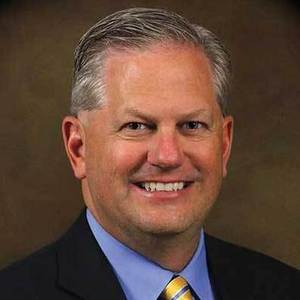Making Connections in Biodiesel

July 12, 2019
BY Donnell Rehagen
It’s been a busy first half of the year for the National Biodiesel Board—a time of travel, relationship building and extending the conversation about biodiesel and renewable diesel to a wide array of audiences across the country. Trade shows and conferences are in full swing, with industry professionals pouring in to talk about what the future has in store. With all the talk being about carbon reduction and cleaner emissions, the future means biodiesel and renewable diesel.
Through sponsorships, expo booths and a variety of speaking engagements, NBB has ensured that our biodiesel messages get heard by key audiences. This spring, important leaders in the industry represented biodiesel at Commodity Classic, the Climate Leadership Conference, National Renderers Association meetings, the National Association of Fleet Administrators Institute & Expo, the National Association of Farm Broadcasters Washington Watch, the Advanced Clean Transportation Expo, and much more. To continue to highlight our efforts and increase our footprint, I have had my boots on the ground working to develop and strengthen relationships with collaborative partners.
In a new setting for the biodiesel conversation, I was invited to San Antonio, Texas, for the annual meeting of the American Fuel & Petrochemical Manufacturers, where I participated on a panel with Bob Dinneen from the Renewable Fuels Association, Rob Underwood with the Petroleum Marketers Association of America, and Chet Thompson of AFPM to discuss the current status of the Renewable Fuel Standard and what we expect in the future. AFPM’s annual meeting is described as the world’s premier refining meeting, assembling key executives and technical experts from refining and marketing organizations worldwide, as well as representatives from associated industries. The petroleum industry remains an important partner of the biodiesel industry. As one of the largest buyers of biodiesel, it is important for the two groups to share common goals and success. Afterall, almost all of our product makes it to market with the help of our petroleum partners. It is important to stay aligned by attending meetings like this, as well as having petroleum industry leaders attend and speak at our National Biodiesel Conference & Expo.
In addition, NBB sponsored and presented at the annual California Advanced Biofuel Alliance in Sacramento. California continues to be an important market for biodiesel and NBB is happy for the opportunity to speak in front of this critical stakeholder group.
We have also hosted several strategic fly-ins to Washington, D.C., to fuel our advocacy efforts. In April, NBB’s governing board members met in D.C. where they visited Capitol Hill to meet with senators and representatives about biodiesel’s federal policy issues. Chief among these issues is the reinstatement of the biodiesel tax credit, which is vital for our industry to be able to grow and plan for the future.
NBB’s June membership meeting was also hosted in our nation’s capital. This meeting allows our larger membership base to continue its very important advocacy efforts with legislators on the Hill. At the meeting, NBB staff, key contractors and invited guest speakers provided insights and updates on the main issues we are facing as an industry. Featured at the June membership meeting was advocacy for the biodiesel industry’s policy priorities, including tax incentives, trade and the RFS, technical advancements, sustainability program initiatives, the latest in state policy movement, communications campaigns, and more.
In this busy season of advocacy and travel, our team also held multiple regional member meetings, where we led discussions on critical regional issues, high-level industry efforts, and other items in small group settings. Regional meetings provide an excellent opportunity for a more in-depth focus on issues that may not be available at larger gatherings. Attendees often share that they are able to ask questions and get a better understanding about programs and topics that they did not know about.
Ultimately, I’d like to recognize our governing board for its strong commitment and willingness to share leadership with our organization and industry. I am beyond proud of the staff and team at NBB but, with the insights our industry members share with us, we can be much more assured of an accurate picture of the issues that really impact our industry. The volunteers who make up our governing board commit a lot of time and resources to making sure our industry is on a path to success. I am grateful to each of them.
Through these extensive conversations and connections throughout the industry, it’s clear that biodiesel is making an impact among the crowds. With these meaningful face-to-face interactions, the National Biodiesel Board is showing how biodiesel is providing benefits and creating a future for America’s advanced biofuel.
Author: Donnell Rehagen
CEO
National Biodiesel Board
Advertisement
Advertisement
Related Stories
President Trump on July 4 signed the “One Big Beautiful Bill Act.” The legislation extends and updates the 45Z credit and revives a tax credit benefiting small biodiesel producers but repeals several other bioenergy-related tax incentives.
CARB on June 27 announced amendments to the state’s LCFS regulations will take effect beginning on July 1. The amended regulations were approved by the agency in November 2024, but implementation was delayed due to regulatory clarity issues.
SAF Magazine and the Commercial Aviation Alternative Fuels Initiative announced the preliminary agenda for the North American SAF Conference and Expo, being held Sept. 22-24 at the Minneapolis Convention Center in Minneapolis, Minnesota.
Saipem has been awarded an EPC contract by Enilive for the expansion of the company’s biorefinery in Porto Marghera, near Venice. The project will boost total nameplate capacity and enable the production of SAF.
Global digital shipbuilder Incat Crowther announced on June 11 the company has been commissioned by Los Angeles operator Catalina Express to design a new low-emission, renewable diesel-powered passenger ferry.
Upcoming Events










